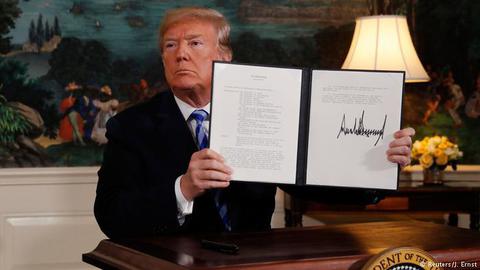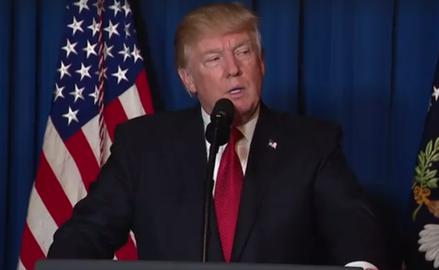Now that President Trump has announced that the US is withdrawing from the nuclear deal with Iran, the Islamic Republic is once again in a dire situation — similar to one it was in 13 years ago, when Mohammad Khatami was president and negotiations for a nuclear agreement with three European countries was on the verge of collapse.
In recent weeks, Iranian officials have reacted strongly to the prospects of a US withdrawal, and some even threatened to pull out of the Treaty on the Non-Proliferation of Nuclear Weapons. But now that Trump has decided to exit the Joint Comprehensive Plan of Action (JCPOA) and re-impose unilateral sanctions, Iran has announced that, at least for a short duration, it will remain in the agreement and will make a final decision after evaluating the situation.
Immediately after Trump’s speech, President Hassan Rouhani announced that in the coming weeks, Iran will enter negotiations with remaining partners in the nuclear deal to decide whether staying in the JCPOA is in Iran’s interest or not. The most important partners Iran wants guarantees from are the United Kingdom, France and Germany, plus the European Union and its 28 member states. And Foreign Minister Mohammad Javad Zarif pledged to “spearhead a diplomatic effort to examine whether remaining JCPOA participants can ensure its full benefits for Iran.”
For Iran to benefit from staying in the JCPOA it must receive clear guarantees from this group of signatories.The long list of these guarantees includes: Iranian petroleum exports to Europe, with France as its biggest client, to continue; contracts for the purchase of aircrafts from Air Bus and the Franco-Italian plane manufacturer ATR to be carried out; the contract between Iran and the French petroleum giant Total — the biggest oil and gas contract for Iran following the signing of the JCPOA — to remain in place; and import-export activities and commercial and industrial cooperation, big and small, to continue, even in the field of nuclear technology.
Trita Parsi, president of the National Iranian American Council, spoke of the political and economic pressures Iran faced within even a couple of hours of Trump’s announcement. “We see already now ambassadors of the US are telling German companies to quickly get out of the Iranian market. And even if some businesses stay, at the end of the day, what the Iranians were promised was normalized trade — not that some companies stay, but that any company that wants to stay can, that all of these other concerns that existed before would be taken away.
No Easy Guarantees
The guarantees Iran demands wil not be easy for European countries to meet. US laws pertaining to oil and gas sanctions are severe, and when the sanctions go into effect toward the end of the autumn, banks that provide financial services in this area can be subjected to heavy and crushing fines. And since the European passenger planes use American-made parts, their sale to Iran will require permits from the US Treasury Department. Also, trade deals must stay clear of extensive American sanctions on transactions in dollars.
The 2005 nuclear negotiations with France, Germany and the United Kingdom [E3] fell apart exactly because these countries failed to get US consent in similar areas. And the falling apart of agreements led to increasing tensions between Iran and the West which, in turn, led to a series of international sanctions against Iran from which the Iranian economy has yet to recover. Tweeting about Trump's annoucement on May 8, Mark Dubowitz, the CEO of Washington DC-based think tank Foundation for Defense of Democracies, said: "I would've much preferred to see a US-E3 agreement first. This would have put the US in a stronger diplomatic position. I think the US & Europeans were close to getting this done."
Now Iran’s conditions for staying in the JCPOA is for Europe to succeed in doing something that it failed to achieve 13 years ago.
Relations with Russia and China
The nuclear deal, of course, has two other partners as well — Russia and China. In recent years, Iran has developed very warm political, military and even economic relations with Russia. Since Russia itself is under European and US sanctions, the likelihood that these relations will remain warm is very high, at least in the short run.
Iran has also maintained good relations with China since the implementation of the JCPOA. China and the US have been partners in redesigning the Arak heavy water reactor in Markazi province. Heavy water reactors are capable of producing plutonium that can be used in nuclear weapons and for this reason, Arak nuclear complex was a major point of contention between Iran and the international community. The JCPOA provided a solution, and probably one of the guarantees Iran wants is that China will continue with the project.
But more important than this mostly symbolic project is a guarantee that China will buy Iranian oil. China is one of the oldest customers of Iran’s crude oil but when the US imposed petroleum-related sanctions on Iran, it gradually reduced its purchases from Iran. It also delayed payments for oil imported from Iran. Officials from the Rouhani administration say that China still owes Iran money.
Last winter, when Trump’s threats against the JCPOA reached new heights, China reduced its imports of crude oil from Iran by 17 percent, and this action was regarded as a preparatory move for dealing with renewed sanctions. A guarantee of resistance against American oil-related sanctions, due to start six months from now, may be one of Iran’s main demands of China.
Iran wants the remaining participants in the nuclear deal to guarantee that, in the face of renewed US transnational sanctions, they will not treat Iran the way they did during the pre-JCPOA days. If Iran succeeds in winning these guarantees, the JCPOA will probably stay alive, albeit minus the USA. Otherwise, Iran has three options, none of which are possible without a crisis:
1. Total Compliance with JCPOA:
This option means retaining the restraints on the nuclear program and extensive cooperation with the International Atomic Energy Agency (IAEA) — but without benefiting from the lifting of the sanctions. Such a choice would expose the government to such an onslaught from hardliners that, as Rouhani himself once said, it would topple any Iranian government.
2. Partial Compliance with JCPOA:
This option means that restraints on the nuclear program would be removed but comprehensive cooperation with the IAEA would continue. This choice could lead to a storm of criticism from the opponents of the government who equate IAEA inspections with revealing national secrets. But moderates would probably defend it by arguing that such inspections would convince the world that the Islamic Republic’s nuclear program is a peaceful one.
3. Complete Exit from JCPOA:
This choice, of course, means returning to pre-JCPOA conditions. Resuming Iranian nuclear projects without the extensive inspections that IAEA now carries out would lead to new American pressures on Iran and would likely strengthen the hand of people like John Bolton, President Trump’s National Security Advisor, who advocate military action against Iran.
The relatively calm phase of the post-JCPOA era has come to an end with exit of its most important participant, the United States. Iran will not have an easy time choosing any of the limited options before it. Whatever option it chooses, the process will begin by triggering pressures from both inside and outside of Iran, and will lead to a new international crisis under conditions that are worse than what they were 13 years ago. The groundwork for the tried-and-true sanctions already exist, and today, the White House is home to unpredictable politicians who are, of course, hostile toward Iran.


























comments